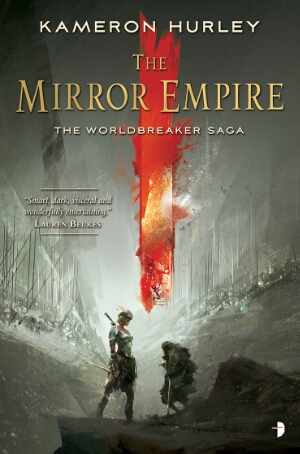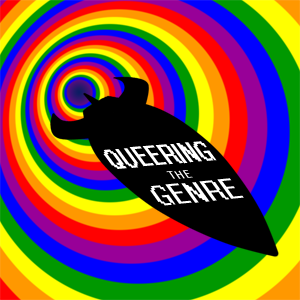On the eve of a recurring catastrophic event known to extinguish nations, a troubled orphan evades death and slavery to uncover her own bloody past. As the dark star of the cataclysm rises, an illegitimate ruler is tasked with holding together a country fractured by civil war, a precocious young fighter is asked to betray his family and a half-Dhai general must choose between the eradication of her father’s people or loyalty to her Empress.
Through tense alliances and devastating betrayal, the Dhai and their allies attempt to hold against a seemingly unstoppable force as enemy nations prepare for a coming together of worlds as old as the universe itself.
One world will rise – and many will perish.
~~~~~
Kameron Hurley is well established, at this stage, as a writer who pushes boundaries, who innovates, who embraces and applies new ideas and ways of doing things. The Mirror Empire, her first new book since finishing the Bel Dame Apocrypha in 2012, in some ways is less radical than that science fiction series; in other ways, however, it bears some of the hallmarks of Hurley’s mould-breaking brilliance.
If the blurb makes The Mirror Empire sound like a complicated novel, that’s because it is one. Despite the farmhand-to-powerhouse trope (subverted in that this time, it’s a girl; and again in that the other farmhand who becomes powerful knows he is the son of the ruler), and the slave-race (the daijin under the Saiduan and Dorinah powers are Dhai who, Hurley makes it very clear, have been broken to slavery as a people; the independent Dhai, once an imperial power, are now isolationist and pacifist vegetarians), The Mirror Empire introduces some fantastic new concepts into the realm of epic fantasy, not least the multiple-worlds interpretation of quantum physics.
As one character after another realises and exclaims, “We’re fighting ourselves.” The Mirror Empire is in a mirror-universe where the Dhai retained power; I didn’t pick up on this until a fifth of the way through the novel, myself. The central conflict of the novel, then, is between the mirror-Dhai trying to leave their world for the “prime” – and needing to wipe out all the Dhai in the “prime”, because they can’t cross between worlds if their double lives; and the various powers in the “prime” world (who, unlike the mirror-Dhai, are all morally complex powers, none of whom can be called outright evil), trying to defend their homes. However, the status of the Dhai as a once-empire, the Saiduan as those who overthrew them, and the Dorinah as a province of Saiduan that successfully won independence, means that those in the “prime” world are as prone to stabbing each other in the back as they are to defeating the mirror-Dhai. The plot weaves a complex knot that, at the end of The Mirror Empire, is made more complex by an unnecessary epilogue that, I think, would have made a better prologue to the next volume; as it is, Hurley leaves us with such a full, complicated plot that it’s clear she can take us through at least a trilogy in this world-breaking conflict.
The characters of The Mirror Empire are all surprisingly winning. From Akhio, the farmhand (well, ethics teacher at a farm) who becomes Kai after the death of his sister, whose unwillingness to rule doesn’t stop him trying to, through Roh’s affable enthusiastic teenage blundering about, to Zezili, raised in a matriarchy where men who are allowed to live are property and to be treated as such, who is half-Dhai but most famous for defeating that people, and Anavha, Zezili’s husband-slave, who has one of the most disturbing points of view in the book, as a victim of essentially domestic abuse; Hurley does an impressive job of writing rounded, interesting full characters, who have understandable and believable motivations for all their actions. Perhaps Lillia is the epitome of this; thrown from one world to another by her mother as a child to save her life, she is driven and motivated in an entirely believable way and incredibly well written.
This is also, it’s worth noting, a book as queer as the Bel Dame Apocrypha, if not queerer. The Mirror Empire‘s cultures all have multiple genders – three or five; and bisexuality is completely normalised and expected. The Dhai are a polyamorous society, where multiple-person marriages with all sorts of configurations of gender are shown without comment, and the men of Saiduan seem to be shared at their owner’s whims. Hurley has also included the Orlandoesque character of Taigan, who changes gender with the seasons; we see Taigan as both male and as an intersex individual in the novel, but presumably in future installments we’ll see her become female too. The one criticism I have is that Hurley only ever uses binary pronouns, which can be startling; someone who thinks of themselves as neither male or female will still be referred to as “he” or “she”, and I think The Mirror Empire might have benefited from greater use of Spivak or even invented pronouns.
There is so much more to this book than will fit in any reasonable length of review; but hopefully I’ve captured some of the glorious essence of The Mirror Empire, even without discussing the moon-based magic system, the “Winter is Coming”-style prophecies of doom, the various characters I’ve not even mentioned who are wonderfully rounded humans, the nuances of the different cultures, the different strands of plot and internecine infighting; Hurley has really come into her full strength with the start of the Worldbreaker Saga, which reads like an angry, feminist George R. R. Martin dropping acid and using steroids.
This novel has more substance to it than most entire series of fantasy with a pagecount less than many single volumes from those series, and I heartily recommend that you pick up a copy of The Mirror Empire when it is released in September.
DoI: This review was written based on an ARC sent by Angry Robot Books in response to a request for one. The novel will be released in early September, around which time I will reblog this review and post a guest-blog from Kameron Hurley.



Reading this…I focused on different things for my own review (which is embargoed until August). But all of this is also true, and awesome
[…] Read it. […]
[…] 2014 (which aren’t necessarily books published in 2014)? 1. Ancillary Sword by Ann Leckie 2. Mirror Empire by Kameron Hurley 3. Spirits Abroad by Zen Cho 4. Full Fathom Five by Max Gladstone 5. The Shadow Throne by Django […]
[…] “This is also, it’s worth noting, a book as queer as the Bel Dame Apocrypha, if not queerer. The Mi…“ – The Mirror Empire – Kameron Hurley […]
[…] at times but with an intensely humane core that is never buried under the horrors (scary trees! Is this the next […]
[…] salvation. ~~~~~ I’m a big fan of Kameron Hurley’s Bel Dame Apocrypha and enjoyed Mirror Empire, so when I heard that she had written a new, stand-alone piece of feminist science fiction, I was […]